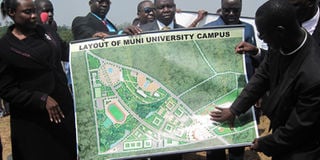Prime
New Muni University in land, name row with Arua locals

Fr. Epiphany Picho Odubuker, the Muni University secretary and Education Minister Jessica Alupo display the layout of the campus in Arua last year. PHOTO BY FELIX WARROM
What you need to know:
Community members who offered the land to the university resolved that they would withdraw part of it.
The new Muni University that is expected to start its first academic year this August is locked in a wrangle with the local community who provided land to the institution. According to the LC3 chairman of Madi Okollo Sub-county, Mr David Agbara, when the community donated the land, they thought the whole facility and administration would be stationed in Madi.
“We thought that the whole university would be constructed here but recently we were told that only a branch of it would be stationed here. So we decided to review the whole agreement,” he said, adding that they have not rejected the construction of the university.
The community members who offered the land resolved that they would withdraw part of the land. During signing of the agreement of the land offer for the university, only 49 community members signed. “The name Muni in Madi is an insult to the people here because Muni is located in Ayivu. But since we have been promised that the Parliament would determine the name of the university, we shall wait,” he said.
A section of community members stopped surveyors midway from surveying the land. In a meeting held on Thursday afternoon, a community member, Mr Samuel Oluma, said the negotiation for the university was West Nile University and not Muni. “How did this name of Muni University come in yet we negotiated with West Nile University?” he said.
The University Vice Chancellor, Prof. Christine Dranzoa, said the future of children is determined by the decisions now and that the community should be partners in development of the university.
“I do not believe that I will still come here and get the same chairperson who handed over the gift (land) to us and government and then reverse his decision,” he said. But on the review of the agreement, only eight members have yet appended their signatures to the resolutions of withdrawing part of the land. The community had offered the university land which was initially used as a refugee hosting area.
After repatriation, the land was handed over to the district, including the infrastructure like schools, health centers and water points. The university was to use the existing structures left by refugees for start up of faculties while new structures are to be constructed.
This is the first public university in the region that hoped to improve academic standards, reduce transport costs, school fees and accommodation costs for both parents and students.
In December last year, the Minister for Education, Ms Jessica Alupo, said the university would need Shs15 billion to start structural development in the areas where land has been offered.




